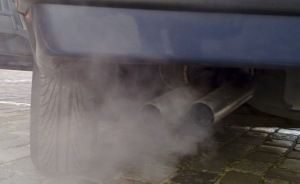News
Technology News in Brief: State rules out petrol car ban like in Sweden
This article is more than 9 years old.
Elsewhere, there’s a new database for amateur archaeologists and Danish solar power for Tanzania

You’d be able to see squeaky clean Sweden in the background had it not been for the fumes (photo: Ruben de Rijcke)
Venstre’s spokesperson for environmental issues, Erling Bonnesen, has ruled out a Danish ban on petrol-driven cars similar to the one planned by Sweden from 2030. Bonnesen said any change would need to be consumer-driven, and that the government would continue to support the production of electric cars. Socialdemokratiet said it supported Venstre’s stance, but favoured reintroducing its registration tax breaks for electric car owners – an incentive Venstre will have completely phased out by 2020.
READ MORE: Electric car sales plummet in wake of registration tax
New database for historic discoveries
The number of treasure trove finds found by metal detector-wielding amateurs has never been higher. Some 9,756 items have been submitted for evaluation in 2016 – up from 5,556 in 2013. But the actual number of items of historical interest could be much higher, which explains why the Association of Danish Museums has launched a new database, DIME (Digitale Metalfund), for amateur archaeologists to register all their finds. It is believed the new database will ease the administrative burden and provide professional historians with even more information about Denmark’s past.
READ MORE: Record number of archaeological finds swamping National Museum of Denmark
Artificial reef to improve water, but at what cost?
By the close of the day on November 3, the organisers of a stone collection for an artificial reef in Limfjorden will know how much local approval it has. Landowners have been asked to collect 18,000 cubic metres of stone to build a 300 x 40-metre reef in the Løgstør Bredning body of water, which is expected to improve the water quality over the next five years. However, environmentalists are concerned about the effect the stone removal might have on local habitats. The Environment Ministry has allocated 20 million kroner to the project.
READ MORE: Ministry wants to protect important Danish reefs
Danes launch ambitious Tanzanian solar power initiative
A Danish energy company, M-PAYG, has launched an initiative in Tanzania that will enable locals to access electricity via their own solar power panel for 34 kroner a month. Once they have paid for 36 months via mobile banking, they will own the panel outright and continue to use it for free. Only 6 percent of Tanzanian rural households have access to electricity. Most Tanzanian households that use electricity pay 54 kroner a month. M-PAYG expects to recruit 1,000 customers in 2017 and to eventually expand into other east African countries and India.
READ MORE: Denmark world champs in addressing sustainable energy
KU enjoys high ranking for scientific papers
The University of Copenhagen has been ranked 22nd worldwide in the NTU Rankings – the annual performance ranking of scientific papers for world universities. Aarhus University finished second in Denmark at #86, with the Technical University of Denmark (DTU), the University of Southern Denmark and Aalborg University also making the top 500.
READ MORE: Erroneous facts, elusive rats and embellishing repats










































